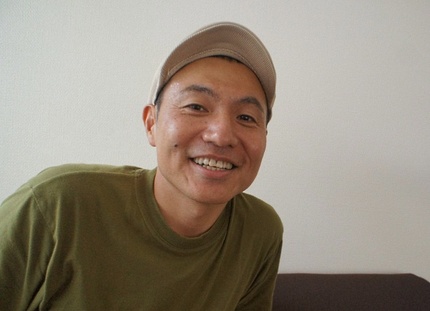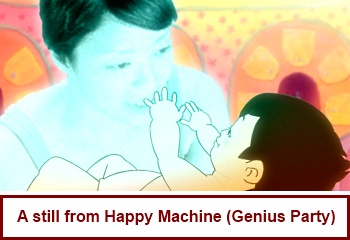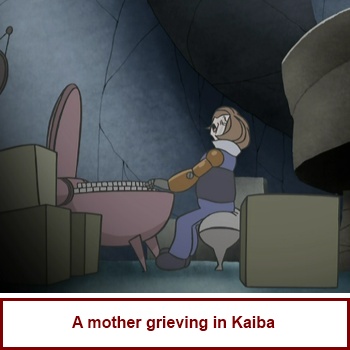Interview: Yuasa Masaaki Talks About Anime! Part 2 of 2: Film, Music and Eroticism...

In part one of our interview with renowned animator Yuasa Masaaki, we covered the release of his new short Kick-Heart, the way it was produced and funded.
In this second -- and much longer -- part, we cover pretty much everything else! Money, films, music, inspiration, work and sex... you name it.
Read on...
A few months ago, we published a list of directors who we'd love to give 100,000,000 dollars to make a film, anything they'd like, just to see what they'd do with such a budget. You were on that list. So my question is: what would you create with that amount for a project?
Oh, it's hard to think of spending that on one film although that would be nice. I'd rather have that amount to make ten films though! [we all laugh]
You often use live-action footage or photo collages in your projects. These show up for example in THE TATAMI GALAXY, and even in your contribution to GENIUS PARTY. Do you ever have the urge to do a fully live-action project?
 It's not like I'm aiming to do a live-action film, but if I would get a chance to do it I would LOVE to do it!
It's not like I'm aiming to do a live-action film, but if I would get a chance to do it I would LOVE to do it!
What kind of film would you like to make then? Horror? Romantic comedy? [We all laugh]
I think animation is often the most efficient tool to do what I want in a project, but I have a lot of ideas for what to do with live-action. I love animation but you can do lots of different things with live-action, other possibilities. You can have live-action with lots of cgi special effects, or do the opposite and make live-action very quiet, very certain, you could do those too.
If I do a live-action film, I would like to make a really crazy one, and then have it turn into a very calm one.[We all laugh]
Another returning aspect of your work, which is also very apparent in KICK-HEART, is that music is very important. At what point during a project do you integrate the music? Is that early on in the scripting stage or much later? Do you start with a composer in mind?
In the beginning, when I start with a project, I already have the type of music in mind which I want to use. For example techno, or fast music, or, I don't know, old-fashioned maybe. So I have a concept, but I do not really decide on a piece until... like I said before about the designs, until I have just finished the storyboards. Then I know if I need more of a sad mood, or a fun mood. Again, most people do this before they make the storyboards, but I prefer to add music later.
But how important is music to you? Because for MIND GAME, Watanabe Shinichirō [director of COWBOY BEBOP and SAMURAI CHAMPLOO] worked on the music, and he is known to be a fanatic. Are you fanatic about music as well or is it just another part of movie-making for you?
For Mind Game, I made Watanabe Shinichirō the music producer because he knows so much about certain musicians. I had a very clear idea of what I wanted and Shinichirō would then be able to arrange the right artists. They would play for me and I would tell Watanabe Shinichirō what bits I liked, I gave him feedback. He knows so many music artists in Japan, I could use him as the middleman, my connection to the people I wanted.
And later, during the editing phase, Watanabe-san would be there giving advice, and tell me "don't put this piece of music there, better wait and put it THERE!", which he was always right about. It was very helpful having him around. A few times he'd point out that we could switch music around between scenes, which was something that had never occurred to me you could do, but this switching turned out to work very well! We were very happy with the result.
 I do need to ask... In KAIBA, there is the scene where the mother plays the piano, gets her memory back and recalls how much she loved her stepdaughter. As a parent, that part affected me immensely, it actually made me cry. The music is so ingrained in this entire sequence, I cannot believe you put it there afterwards. At what point in the process did you add that piece, and what did you think when you heard it for the first time yourself?
I do need to ask... In KAIBA, there is the scene where the mother plays the piano, gets her memory back and recalls how much she loved her stepdaughter. As a parent, that part affected me immensely, it actually made me cry. The music is so ingrained in this entire sequence, I cannot believe you put it there afterwards. At what point in the process did you add that piece, and what did you think when you heard it for the first time yourself?
Oh, I was very happy when I heard it, and I am very pleased with the result, with what the musician made.
Indeed, for that specific scene we needed the music earlier, as it was such an important part. We asked the musicians to start with this piece first, so we would already have it when we did the animation. And right from the beginning, from the first time I heard it, I loved the impression of this music. That piano piece. Yes.
Your work is just such an explosion of creativity, it's really excellent. Where do you get your inspiration from? Are there any films that you like in particular?
Anything I hear or see, even on television, can be inspiring. One recent film I really liked a lot was The Kirishima Thing, that one was very interesting.
Making animation is a tough job and often means making long weeks. What drives you as a film/animation maker to do your best?
When making a television series it can feel like a 100 meter dash. It's an intensely speedy process, where you are always busy and have a very hectic schedule. You are constantly faced with having to make decisions on the fly. This can sometimes lead to unforeseen problems down the line and some accidents can occur. They may seem like nuisances to some people but to me I really find these moments really exciting and challenging. It can feel like when you are surfing and you see that big wave heading your way. These accidents can also lead to new and surprising results that without them happening, I would not normally been able to come up with on my own.
Making truly great animation is an even tougher job. From your point of view, how much do think you have figured out of that type of skill? Are you ever satisfied?
As an animator, I still find it very difficult and I have yet to feel satisfied with my ability. On the other hand, as a filmmaker and storyboard artist I always felt happy with my work. I remember when I completed my first storyboard and how great it felt when people read it and told me they enjoyed it. I could not please everyone with that storyboard but it was great motivation after that to try to have my work connect with more people
But at what point are you satisfied? How much time do you typically take to make a film?
When I complete a project and I feel I was able to get about 70% of what I wanted to get across in the final result, then I feel overall satisfied with the film.What gets me excited is when I am finally able to present my film to an audience. It is satisfying after all that hard work, when I get to see people enjoy the final result.
Your animation almost never looks like what we, in the West, consider to be typically anime. Bill Plympton has stated that he doesn't consider your work to be Japanese animation, but worldwide animation. He also says MIND GAME is one of the best and most important films made in the last decade. So my question is: how do you feel about Japanese animation in general? Do you distantiate yourself from it?
In Japanese animation there are a lot of technical professions. And there are a lot of people in japan who are very good in their jobs. They are professionals, specialists with great technical skills in their own area. That can be both a good thing and a bad thing. Because often, when someone is really good at what he's doing, he keeps being asked to do the same again and again. And in Japanese animation I see so many people now doing similar things. They are good at what they are doing, but sometimes I wish people would try to do different things, I hope they will do NEW things. So much animation is mainstream, while I'd like more to be interesting.
And I want to see more relaxed animation coming from Japan, animation where everything is not so perfectly drawn. The strict way it looks now, it sometimes seems like working on anime is more pain than pleasure! [We all laugh] I prefer to have joy in making animation.
 Speaking of pain and pleasure in anime, I notice that in your work, there is always a lot of eroticism to be found. It's there in KICK-HEART, KEMONOZUME, and MIND GAME has one of the best animated sex scenes ever. And instead of these being "hentai", your scenes are aways really beautiful. Instead of the technical aspects of sex, you always manage to show the emotional side, the feelings. How do you approach erotic content in your work, and how important is it for the stories?
Speaking of pain and pleasure in anime, I notice that in your work, there is always a lot of eroticism to be found. It's there in KICK-HEART, KEMONOZUME, and MIND GAME has one of the best animated sex scenes ever. And instead of these being "hentai", your scenes are aways really beautiful. Instead of the technical aspects of sex, you always manage to show the emotional side, the feelings. How do you approach erotic content in your work, and how important is it for the stories?
I always want to describe sex as personal. I want to show the feelings of the characters. For this I use my imagination: what does this feel like? This way or this way? It's just a hunch, sometimes, but instead of doing a regular love scene I want to make it as personal as possible.
I mean, that's how I approached Maskman M in Kick-Heart. He is not me, but I thought hard on how he'd feel about it.
But that is what is so impressive! Even when you're not into SM at all, you can still see why this is so attractive to Maskman M. What you did with the sweat and the flowers, that was magnificent!
Thank you, I'm glad you really enjoyed that scene. On the other hand, for the sex in Mind Game, I did some research, ehm... [We all laugh]
No, I mean, for example, I asked the staff working on the film some questions about sex, and their feelings. And I was embarrassed, it felt like sexual encouragement, you know: "Say, how do you feel about..?" [We all laugh]
...yes, and female co-workers as well, can you imagine asking them things like "How does it feel like, when you, you know, when you REALLY get into it?" [We all laugh]
So we were all dedicated but I felt very uncomfortable asking this!
That reminds me: my wife has a really low threshold for fan-service and hentai, she really hates it. But when I showed her MIND GAME, when that scene came up she said: "Hot damn!" [We all laugh] She loved how you handled the sex in MIND GAME, and the lust in KICK-HEART.
That's great, I really enjoy hearing this! I'm very pleased with that. I mean, like I said, I tried to make those scenes as personal as possible, but I'm never sure that the way I imagined it will make other people feel the same way. It might affect ME a certain way, but it's unique for each person.
I'm happy if I am successful in sharing the feelings I try to show. So I like it very much, to hear that people are affected the same way as I was by these scenes.
Your work is unmistakably rather genius but isn't very accessible to large audiences. Series like KAIBA, KEMONOZUME and THE TATAMI GALAXY sadly haven't received a wide Blu-ray release yet (for example North America is still waiting). So this makes me wonder: are you aware of how your work presents itself? And do you change the way you work to connect to a larger audience?
When Mind Game was released, it was not able to reach a wide audience. Ever since then I would like to have my films reach a wider audience. I would be very pleased if more people could enjoy my work. When I find that I was not able to connect to some portion of an audience, then it motivates me to find new ways to better communicate my ideas.
What are you going to share next? We heard you were very busy, so can you tell us about upcoming projects?
Currently I'm participating on several series which will be out next year. For two of those, I will be responsible for a special episode.
And that concluded the interview. Special thanks go to Justin Leach for helping arrange access to Yuasa-san and the pictures of him, and to Eunyoung Choi who was our interpreter, together with Tom Hudson.
This article is a combined effort by me and Peter van der Lugt, so please note (before Peter gets into trouble...) that when a question is about me crying or involves my wife, I was the one asking it. The questions of a more technical nature are undoubtedly Peter's though!
Yuasa Masaaki's work is not the easiest to 'capture' (or even find, for that matter) so we leave you with the trailer for The Tatami Galaxy, as that gives a good example of how eclectic his body of work is.
And do try and find Mind Game as well, it is available on DVD in several English-friendly versions worldwide. The pictures of the scene shown in this article do the fluid sequence itself no justice, so check that out for yourself!
Peter van der Lugt
contributed to this story.

Do you feel this content is inappropriate or infringes upon your rights? Click here to report it, or see our DMCA policy.






